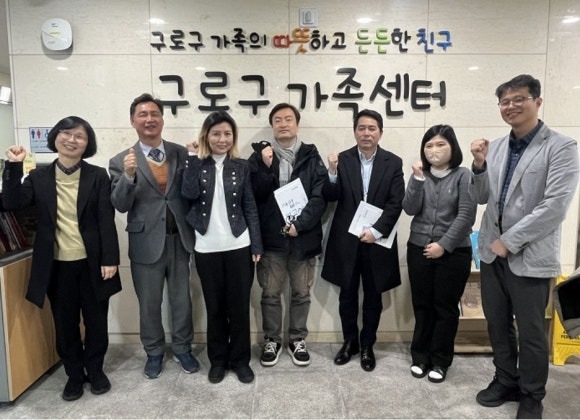
Why Recent Developments in Multicultural Family Support Matter to Foreigners in Korea
Welcome, global citizens! If you’re living in or dreaming of moving to Korea, understanding the strides being made towards supporting multicultural families is pivotal. It directly affects not only the existing foreign community but also the myriad opportunities available for newcomers seeking a place to thrive.
Recently, significant discussions unfolded regarding the operational challenges and needs of family support centers across Seoul. These centers are crucial in fostering a cohesive multicultural landscape. Here, we'll break down why this topic resonates with every foreigner navigating life in Korea.
🌏 What's happening in Korea? (Quick overview)
On March 19th, the Democratic Party's Multicultural Committee held discussions at family centers in Guro and Eunpyeong districts. They focused on the challenges faced by multicultural families and the operational hurdles the centers encounter while implementing support programs. The committee aims to enhance policies for improved integration of immigrants and their families, ensuring their unique needs are met.
💡 Why this matters for foreigners? (Impact analysis)
For foreigners residing in Korea, these developments are essential as they signal a commitment to inclusivity and better support systems. Enhanced policies can facilitate smoother transitions for immigrant families, offering essential services that are tailored to meet their needs—be it education, employment, or social integration. This initiative illustrates a significant shift towards recognizing and addressing the complexities of multicultural living in Korea.
📌 How to take advantage of this? (Step-by-step guide, if applicable)
1. **Stay Informed**: Regularly visit family center websites or social media to find updates about programs and workshops that cater specifically to multicultural families. 2. **Engage in Community Events**: Participate in local gatherings to connect with other foreigners and locals, fostering a supportive network. 3. **Utilize Support Services**: Explore educational and job-seeking resources offered by family centers that can help ease challenges in settling down.
🇰🇷 Understanding Korea's system (Cultural & bureaucratic insights)
Korea’s bureaucracy can be intricate. Family support centers serve as pivotal hubs for multicultural policies, focusing on various aspects like education for the youth of immigrant families, community integration, and economic empowerment. Understanding how these centers operate provides crucial insights into navigating life as a foreigner in Korea, particularly regarding administrative processes like visa applications or welfare benefits.
🌟 Tips for foreigners living in Korea
1. **Learn Basic Korean**: Being proactive in learning the language fosters better community integration and understanding of programs available to you. 2. **Network with Others**: Finding friends and community through cultural events can provide emotional and practical support. 3. **Voice Your Needs**: Engaging directly with family center representatives regarding any es due to experience can shape better services for everyone.
🔮 What's next? (Future trends & additional insights)
The future of multicultural support in Korea seems promising, with ongoing dialogues and further development of policies to enhance the quality of life for foreign families. Continuous engagement from both the local and foreign community is vital for ensuring these programs evolve to meet real-world needs efficiently. Expect more tailored initiatives aimed at students and job seekers in the forthcoming months!
🇰🇷 Learn Korean from this Article!
Improve your Korean language skills with these key phrases from the article:
🔤 Korean Phrase 1: "다문화 가족 지원"
🔤 Pronunciation: "Damunhwa gajok jiweon"
🔤 English Translation: "Multicultural family support"
🔤 Usage Tip: Use this phrase when discussing or requesting assistance services related to multicultural families.
🔤 Korean Phrase 2: "가족 센터"
🔤 Pronunciation: "Gajok senteo"
🔤 English Translation: "Family center"
🔤 Usage Tip: This term is useful when referring to specific community services or resources for families.
🔤 Korean Phrase 3: "외국인 정책"
🔤 Pronunciation: "Oegugin jeongchaek"
🔤 English Translation: "Foreigners’ policy"
🔤 Usage Tip: This phrase is applicable to discussions about legal or community policies affecting foreigners.
🙋 Essential FAQs for Foreigners
Can foreigners participate or apply?
Yes! Many programs and services offered by family centers are designed for foreign residents and their families, actively encouraging participation.
Do I need to know Korean for this?
While knowing some Korean can be helpful, many centers offer resources and assistance in English and other languages.
Where can I find official details?
You can visit the official websites of family centers or social media platforms for comprehensive information and updates on available services.
In conclusion, stay engaged with local family centers and community initiatives to enrich your experience in Korea. Embrace this opportunity to connect, learn, and share insights with fellow residents and locals alike!
📱 Get the BeraKorean App & Stay Updated!
Want to improve your Korean skills and stay informed about life in Korea? Download the BeraKorean app for exclusive content:
- 📱 Android: Download on Google Play
- 🍎 iOS: Download on App Store
📺 Follow us on BeraKorean YouTube for Korean lifestyle & language content!
🌏 Visit berakorean.com for more updates, news, and insights on living in Korea.
🔗 Read the Original Korean Article
Want to dive deeper? Check out the original article here:
📢 Tags
#KoreaNews #LifeInKorea #ForeignersInKorea #KoreaOpportunities #KoreaLiving #LearnKorean #KoreanLanguage